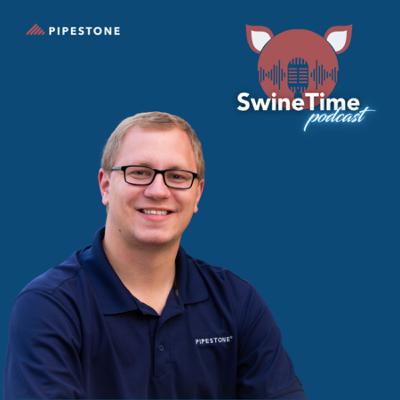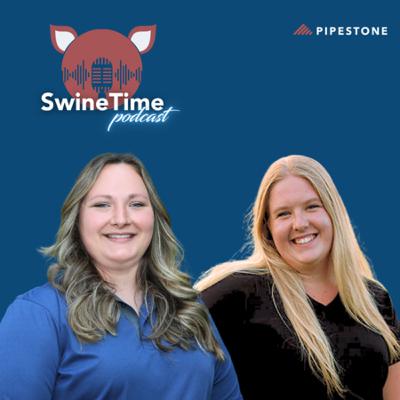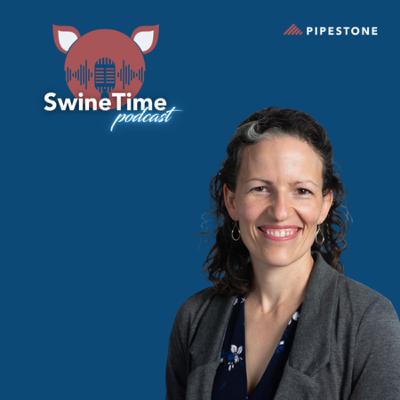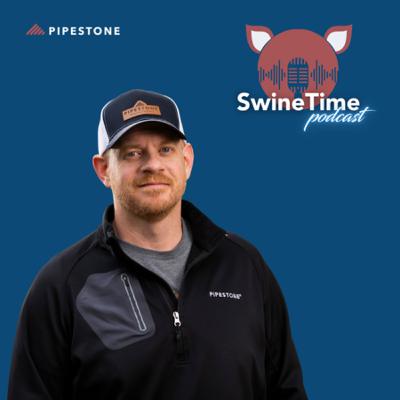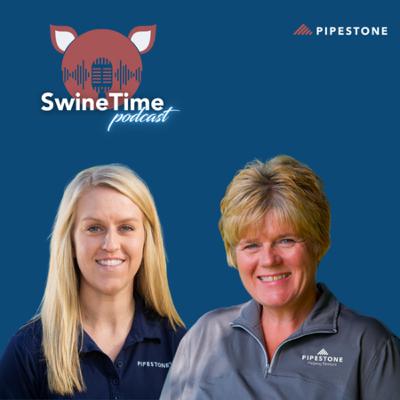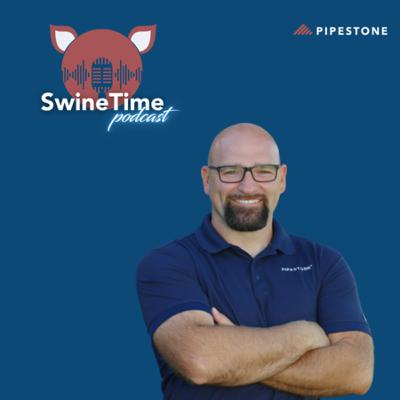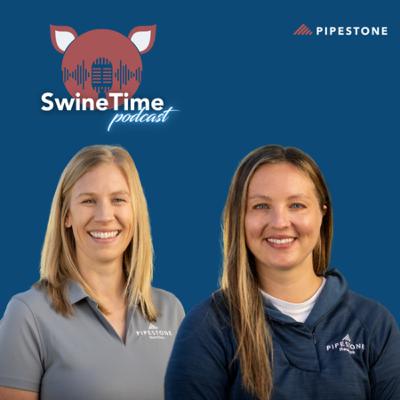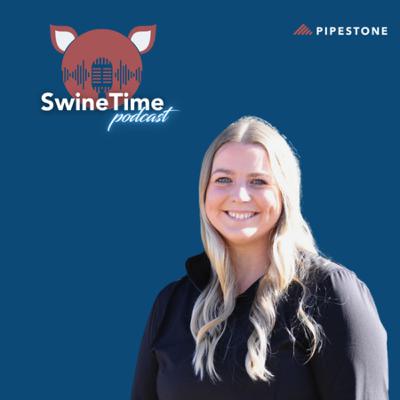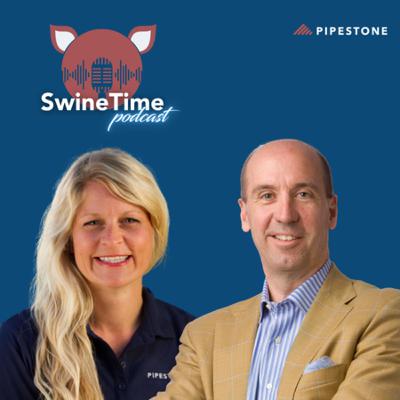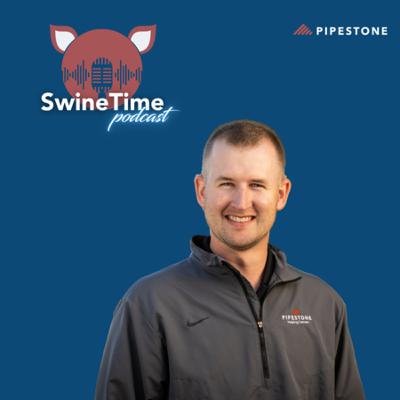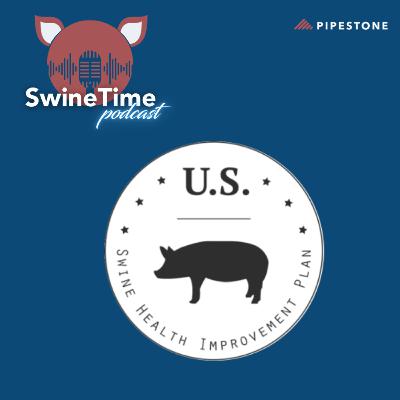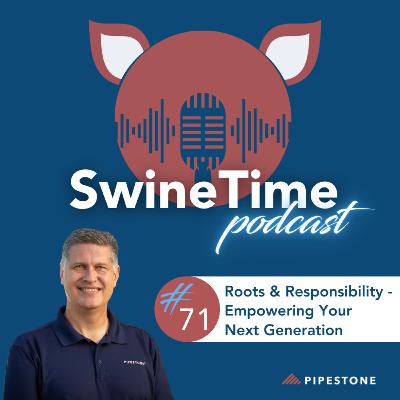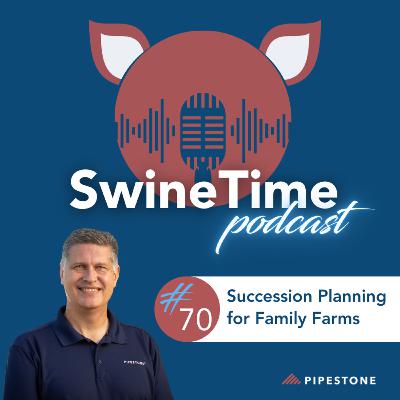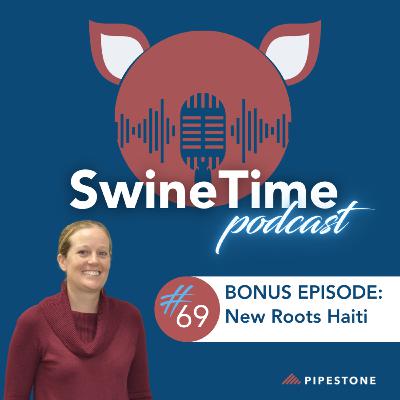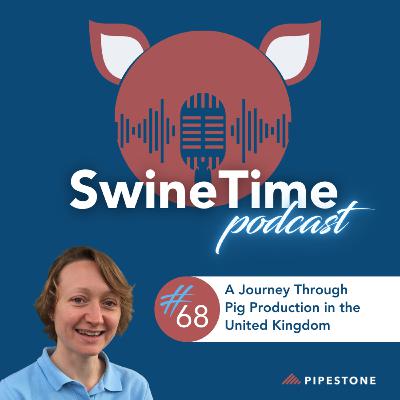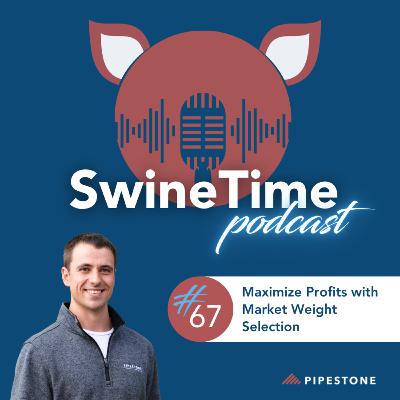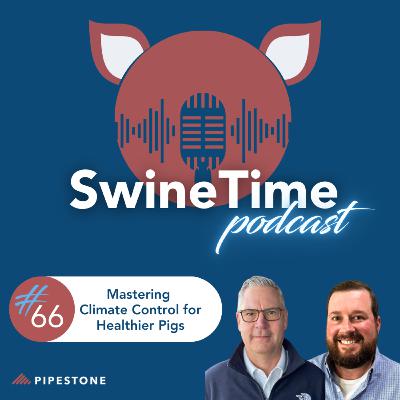Discover SwineTime with Pipestone
SwineTime with Pipestone

88 Episodes
Reverse
In this episode of the SwineTime podcast, staff veterinarian Dr. Spencer Wayne is joined by fellow veterinarian and former partner, Dr. Jean Paul Cano, for a discussion on African Swine Fever (ASF).Dr. Cano is a swine veterinarian originally from Venezuela who completed his PhD in Minnesota and spent years working in U.S. production systems before relocating to Spain with his family. Now practicing near Barcelona, Dr. Cano offers a firsthand perspective on Spain’s recent detection of ASF in wild boar populations—and the ripple effects it has had across the pork industry. ASF is a highly complex, resilient virus that affects only pigs, with a very high fatality rate and no commercially viable vaccine. Unlike more fragile viruses, ASF can survive for weeks in fresh pork, months in cured meats, and even years in frozen products, making biosecurity and containment especially challenging. In late November 2025, Spain confirmed ASF in two wild boars found dead in a state park near Barcelona—the country’s first detection since eradicating the disease in 1994.Dr. Cano explains how geography played a critical role in the response. The affected area is surrounded by urban development and multiple fenced highways, creating a natural containment zone. Authorities quickly established control and surveillance rings, intensified carcass searches and testing, restricted animal movement, and implemented targeted depopulation strategies for wild boars.Beyond animal health, the episode dives deep into economic consequences. Spain exports a significant share of its pork production, so ASF immediately disrupted global trade. While some countries halted imports entirely, others accepted pork from unaffected regions under strict regionalization rules. This approach helped Spain avoid a complete export shutdown, though prices still dropped roughly 30–35% in the weeks following detection.The conversation also draws clear parallels to the United States. Drs. Wayne and Cano discuss how programs like the U.S. Swine Health Improvement Program (U.S. SHIP) are designed to provide the same kind of credibility and structure that allowed Spain to maintain market access. Regionalization, transparent communication, early detection, and pre-established biosecurity and traceability systems all proved critical in limiting damage. The conversation leaves listeners with a practical reminder: ASF isn’t a hypothetical risk or a problem confined to other parts of the world. It’s already moving through major pork-producing regions, and the work done before an outbreak— biosecurity, traceability, and planning—is what determines whether an industry can keep moving forward or comes to a standstill.
In this episode of the SwineTime podcast, staff veterinarian and Pipestone Holdings owner Dr. Spencer Wayne is joined by fellow veterinarian and partner Dr. Joseph Yaros for a practical discussion on one of the most critical aspects of swine production: identifying sick pigs early and responding appropriately.The conversation centers on real-world, barn-level observations that help producers and caretakers detect health challenges before they turn into larger performance or mortality issues. Dr. Yaros emphasizes that early recognition and timely intervention are essential to protecting pig health, animal welfare, and overall production efficiency. To simplify daily pig assessments, Dr. Yaros introduces the “SANTA” acronym, an easy-to-remember framework for evaluating individual pigs: Stance – Pigs standing with drooped heads, low ears, or a dull posture may be showing early signs of illness.Appetite – Slab-sided pigs or those lacking proper belly fill often indicate reduced feed intake and should be monitored or treated.Neurologic signs – Head tilt, circling, paddling, or failure to move normally when approached can signal serious health concerns.Thumping (respiratory distress) – Heavy breathing, coughing, or abdominal “thumping” suggests respiratory disease that may require prompt intervention.Ambulation – Lameness, stiffness, or difficulty rising can indicate pain, injury, or infection.The discussion then expands from individual pigs to overall barn health using the “WINTER” acronym, which focuses on two key indicators: water intake and energy level. Dr. Yaros explains that declines in water consumption often occur days before visible health problems and should be tracked consistently. Low energy in the barn—such as reduced noise or poor response when entering a room—can also be an early warning sign of health challenges.The episode also provides practical rules of thumb for treatment thresholds, helping producers decide when individual pig treatments are appropriate versus when water or feed medications should be considered. Special attention is given to enteric disease in young pigs, where rapid dehydration and rising mortality make swift action essential.Throughout the episode, Drs. Wayne and Yaros stress the importance of proactive communication with your veterinarian, using tools like daily records, photos, videos, and water intake data to guide decision-making. This SwineTime episode delivers actionable insights to help producers improve pig health monitoring, reduce losses, and maintain strong herd performance.
In this episode of the SwineTime podcast, host Dr. Spencer Wayne sits down with Damon Vander Maten, Director of FarmBooks at Pipestone, to dig into one of the biggest questions farm families face: When is the right time to reinvest in your farm assets?Damon brings extensive experience analyzing farm financials,helping producers make sense of balance sheets, debt loads, cash flow, and long-term planning. Together, Spencer and Damon walk through practical, down-to-earth ways farmers can evaluate whether to repair, replace, or rebuild barns and other infrastructure—and how to decide which part of a multi-enterprise operation (pigs, cattle, crops, etc.) deserves capital first.Key topics include:How to know if you're financially ready to invest, usingsimple rules of thumb like matching your percent equity to your age.Prioritizing repairs vs. new construction, and why youshould fix barns before they start hurting production.Comparing returns across your operation—hog barns vs. crops vs. cattle—and how to identify where capital truly pays off.Using financial ratios like current ratio and debt-to-equity to understand your “purchasing power.”Market cycles and timing, including why down years often present the best opportunities for expansion.Build, remodel, or rent? Damon breaks down how to compare the real return on each option.Whether you're a producer weighing your next building project or simply trying to better understand your own financial position, this conversation offers clear, approachable guidance on managing farm assets with confidence and long-term vision.
In this episode, Dr. Spencer Wayne sits down with Hayden Kerkaert, Director of Pig Sales & Marketing for Pipestone Management, to break down the current weaned pig market and what it means for producers across the country. Hayden shares practical insights on what drives pig value, pricing,and performance.The weaned pig market has stayed strong longer than manyexpected. Unlike past short-term spikes, today’s high prices have lasted nearly a year, driven by tight pig supply, health challenges like PRRS, and some producers exiting the industry. Understanding why prices remain high—and whatbuyers are looking for—is critical for anyone raising or purchasing pigs.Hayden and Spencer cover the key factors affecting weanedpig prices, with health status at the top of the list. Buyers need clear, detailed information on a pig’s health, including PRRS status, vaccination history, and disease exposure, because it’s critical for them to know what’s coming into their barn. Vaccinated pigs generally perform better and can command higher value. Misunderstanding or missing these details can lead to costly mistakes, which is why Hayden emphasizes the importance of working closely with your veterinarian. Beyond the numbers, trust and strong relationships between buyers and sellers are just as important—producers who communicate openly and reliably about pig health create lasting partnerships and maintain the value of their pigs.Pig age, genetics, and attributes also matter. Older pigs(23–24 days) often bring a premium because they thrive in the nursery and have lower mortality. Genetics like Duroc-sired pigs, and attributes such as Prop 12 compliance or open pen gestation, can influence contracts and buyer interest. Timing and pig flow management—getting pigs to the right barn at the right time—also play a major role in profitability.Whether you’re a producer selling pigs, a buyer sourcing animals, or managing a sow farm, this episode provides real-world guidance you can put to work today. Hayden breaks down complex market dynamics into practical advice for navigating the weaned pig market, keeping pigs healthy,and maximizing return on every head.Tune in for insights that help you make smarter decisions for your pigs, your barn, and your bottom line.
In this episode of the SwineTime podcast, host and veterinarian Dr. Spencer Wayne sits down with fellow veterinarian, Dr. Rachel Stika-Jensen and veterinary intern, Emma Zwart, to take a closer look at what it’s really like to participate in a veterinary internship within the swine industry. Together, they share practical insights for students, parents, swine veterinarians, and pig producers who want to better understand the value of hands-on training in pig health and production.The conversation begins with what drew them to the ag industry, specifically swine medicine. Emma explains how her internships helped bridge the gap between veterinary school and working directly with pigs, allowing her to build confidence in diagnosing herd health issues, understanding biosecurity protocols, and learning the day-to-day realities of swine practice. Dr. Stika-Jensen offers her perspective as both a practicing swine veterinarian and a mentor, highlighting how internships give future veterinarians a realistic view of what a career in pig medicine entails.Beyond veterinary internships, the episode also explores other opportunities Pipestone offers for students interested in the swine industry. These include roles working alongside swine nutritionists to optimize pig feed programs, positions in production management to understand large-scale pig herd operations, and internships in research focused on pig health innovations. There are also opportunities in marketing, IT, and data analytics—fields that support the business side of swine production. By training and building the industry’s talent today, Pipestone ensures that farmers will benefit from skilled, knowledgeable professionals who drive innovation and sustainability for the future of pig production.Listeners will gain practical tips on how to find high-quality swine internships, key questions to ask before applying, andstrategies for making the most of these valuable experiences. Offering internships is essential for swine companies, as it cultivates skilled, industry-ready professionals who grasp both the science and business of pig production—building a stronger, more sustainable future for the swine industry.
In this episode of the SwineTime podcast, host and swine veterinarian, Dr. Spencer Wayne, is joined by Dr. Kim VanderWaal from the University of Minnesota to tackle a complex but critical topic for pig farmers: PRRS virus classification.Dr. VanderWaal is an associate professor in Veterinary Population Medicine with expertise in swine disease ecology, epidemiology, and big data research. She has spent nearly a decade studying swine viruses, particularly PRRS (Porcine Reproductive and Respiratory Syndrome)—one of the most costly and persistent diseases in pork production. With more than 80,000 virus sequences collected in the U.S., researchers now have a wealth of genetic data to study how PRRS evolves and spreads.The discussion highlights how the industry has shifted fromthe old RFLP typing system, which often gave confusing or misleading results, to a new framework built around lineages, sub-lineages, and variants. This updated approach offers veterinarians and producers more consistent, accurateinformation to evaluate outbreaks and determine whether a farm is facing a repeat infection or something entirely new.Dr. VanderWaal also explains why some PRRS variants—like the well-known 1C.5 strain—spread so aggressively. These viruses require only a tiny infectious dose to jump between pigs, making traditional biosecurity measures more difficult to hold. The conversation further explores how new viruses emerge, whether through gradual mutation or recombination, when pigs carry multiple strains at once.For farmers, veterinarians, and others in the swine industry, this episode offers valuable insight into how PRRS is studied, why accurate classification matters, and how ongoing research is equipping the industry to better respond to emerging health challenges.
In this episode of the SwineTime Podcast, host Dr. Spencer Wayne talks with Paul Frahm, Director of Research Operations, about how research can help pig farmers make practical, informed decisions on their farms.Paul shares his background in the swine industry, starting in sow barns in Iowa before moving into research more than a decade ago. Today, he leads a team that focuses on answering real questions pig farmers face every day—questions about pig health, feed efficiency, genetics, and new technology in barns.Pipestone Applied Research operates 2,400-head barns set up like commercial pig barns, but with additional tools to measure results accurately. Automated feed delivery, precision scales, and split water lines allow the team to test everything from pig feed additives to vaccine programs under conditions that closely resemble what farmers see in their own barns.For producers, this kind of applied research offers meaningful value:Health and welfare – Trials comparing vaccines and treatments can help reduce pig losses and improve overall herd health.Cost efficiency – Studies on feed space, pig density, and nutrition strategies identify ways to get the most out of every pound of feed.Confidence in decisions – Results are based on unbiased data, giving farmers reliable information they can use.Relevant insights – Projects are chosen because they address current challenges in swine production, from disease prevention to barn management.Paul explains that not every study produces groundbreaking results, but even finding that two options perform equally well can help farmers make better choices. “Our job isn’t to prove a product right or wrong,” he says. “It’s to provide good data that farmers can trust.”The goal is simple: give producers the knowledge they need to raise healthier pigs, improve efficiency, and stay strong in a competitive industry. Farmers who want to learn more can connect with their Pipestone veterinarian, swine nutritionist, or production consultant to see how these findings might apply to their own herds.
What happens when you’ve got feed left in the bin after the pigs leave the barn? In this episode, Dr. Spencer Wayne is joined by experts Emily Radcliffe of Pipestone Nutrition and Kim Morgan with FarmPro, to talk through practical options—and potential pitfalls—of handling leftover feed.From when it’s safe to blend feed for the next group to when it needs to come out of the bin entirely, this conversation is packed with real-world advice on managing feed transitions, preventing health issues, and minimizing costly mistakes.
Ileitis might be one of the most common gut diseases in pigs—but that doesn’t mean it has to take a toll on your herd or your bottom line. In this episode of SwineTime, Dr. Spencer Wayne sits down with Dr. AJ Smit to unpack the real-world impact of ileitis and how producers can get ahead of it.From catching sub-clinical signs in the barn to making sense of diagnostics and choosing the right vaccination approach, Dr. Smit shares practical strategies that can help you minimize losses and protect performance.Whether you're battling ileitis today or planning ahead for tomorrow, this conversation has tools you can put to work.
On this episode of SwineTime, Dr. Spencer Wayne is joined byDr. Kiah Berg from Pipestone Nutrition and Erin Little from FarmStats to dig into how wean age affects pig growth, feed efficiency, market weights, and sow productivity. They share real-world data and tips to help you make smart, profitable decisions on your farm. Evaluating your weaningstrategy could be the key to improving swine health and overall farm profitability.
Dr. Spencer Wayne sits down with Carly Bates, a soon-to-be college graduate, to discuss what young professionals look for in agriculture careers and how employers can stand out. They cover the importance of mentorship, networking, and communication, as well as the strong sense of community in the swine industry. Carly shares insights on stepping outside comfort zones, building connections, and why the swine industry offers great opportunities for those willing to put in the work. Whether you're hiring or job hunting, this episode is packed with valuable takeaways!
In this episode of the SwineTime podcast, Dr. Spencer Waynewelcomes futurist and author, Jack Uldrich, along with Hannah Walkes, President of Pipestone Services to discuss how swine producers can prepare for an ever-changing future. Jack shares insights from his "BIG AHA" framework—Awareness, Humility, and Action—helping farmers stay ahead of emerging trends that will impact their operations.From advancements in artificial intelligence to shifts in labor and technology, Jack emphasizes the importance of staying informed, unlearning outdated practices, and taking action to adapt. He highlights how AI is already influencing agriculture and why producers should invest time inthinking strategically about the future of their farms.Whether it’s integrating new technology, preparing for market changes, or developing a forward-thinking mindset, this conversation is all about helping swine producers stay resilient and ready for what’s next.
In this episode of the SwineTime, Dr. Spencer Wayne sits down with Damon Vander Maten, Director of FarmBooks, an offering of Pipestone Business Services, to discuss the crucial role of risk management in farming and how financial discipline can make or break an operation. They explore the pitfalls of emotional decision-making, the importance of maintaining a consistent strategy, and the financial tools available to producers. Whether you're just starting out or have been in the business for years, you'll hear valuable advice on balancing risk, usingthe right financial tools, and maintaining a disciplined approach to farming—ensuring that you're ready for the opportunities and challenges ahead. Tune in to learn why disciplined risk management leads to greater freedom andsuccess in agriculture.
In the latest episode of the SwineTime podcast, host Dr. Spencer Wayne takes a deep dive into the U.S. Swine Health Improvement Plan (US SHIP), joined by experts Drs. Tyler Holck, Tom Wetzell, and Vienna Brown, all of whom play key roles within the program.
U.S. SHIP is a voluntary program designed to safeguard, improve, and represent the health status of swine across participating farm sites, supply chains, states, and regions. Dr. Holck breaks down how this program isn’t just about
compliance—it’s about giving producers the tools and resources to protect their herds and stay competitive in the global market.
Dr. Wetzell shares how U.S. SHIP builds teamwork, bringing
together farmers, veterinarians, packers, and regulators to focus on herd health and disease preparedness. From practical tips for tracking herd status to how this program can open market opportunities even in the face of a foreign
animal disease outbreak, the conversation is packed with real-world insights for producers who want to stay ahead of the curve. If you’ve been hearing about U.S. SHIP and wondering what it’s all about, this episode is for you.
Dr. Vienna Brown outlines how U.S. SHIP is transitioning
from a pilot program into a fully recognized U.S. Department of Agriculture (USDA) initiative, set to be acknowledged by U.S. trade partners. Tune in to hear how this move is paving the way for a stronger, more secure future for U.S. pork production.
Learn more here:
Find USDA draft rule and proposed standards: www.regulations.gov.
U.S. SHIP website: https://usswinehealthimprovementplan.com/
Official State Agencies:
Iowa: https://iowaagriculture.gov/ship
Minnesota: https://bah.state.mn.us/swine
South Dakota: https://aib.sd.gov/swine.html
In this continuation of our discussion on succession planning, host Dr. Spencer Wayne sits down again with Jim Marzolf of Pipestone Business Services to dive deeper into building the next generation of family farm leaders. While the first episode focused on family dynamics, this part tackles the structural and strategic elements of succession, including
organizational roles, accountability, and leadership development.
Learn how to create clear job descriptions, define responsibilities, and empower future leaders while navigating the challenges of transitioning control from one generation to the next. Jim shares insights on fostering intentional growth, balancing authority, and avoiding common pitfalls in family business transitions. If you're navigating succession in your own operation, this episode offers valuable advice and practical steps to build a strong foundation for future success.
In this episode of the SwineTime Podcast, Dr. Spencer Wayne sits down with Jim Marzolf, Executive Vice President of Pipestone Business Services, to discuss a topic that hits close to home for many farm families: succession planning. Passing the torch to the next generation isn’t just about keeping the farm running—it’s about protecting a legacy.
Jim shares practical tips and stories from his years of experience working with farmers, offering insight into how to approach some of the trickiest parts of the process. They discuss everything from setting up a solid plan and handling family dynamics to making sure the farm can keep thriving as it changes hands.
Whether you’re just starting to think about the future or knee-deep in conversations with your family, this episode is packed with advice to help you take the next steps toward a smooth transition—and set the next generation up for success.
In the latest episode of SwineTime, host Dr. Spencer Wayne sits down with Dr. Joel Nerem from PIPESTONE and Nikki Stolberg from New Roots Haiti, an organization doing incredible work to improve the lives of people in and around a small Haitian village. Together, they dive into the amazing ways New Roots Haiti is tackling poverty, hunger, and social challenges through sustainable farming, education, and building strong communities.
You’ll hear stories about the real struggles the Haitian people face every day and the creative, hands-on solutions New Roots has developed to make a difference. From teaching farming techniques that help families grow their own food to programs that empower kids through education, New Roots Haiti is about building a brighter, more sustainable future.
Dr. Nerem and Nikki also discuss why PIPESTONE is proud to support New Roots Haiti and how this partnership is making a real impact. It’s a powerful look at how agriculture
and education can transform lives—and a reminder of the amazing things that happen when people come together to make a difference. Don’t miss it!
In this SwineTime episode, Dr. Spencer Wayne sits
down with UK swine veterinarian, Dr. Alex Thomsett, and explores the ins and outs of UK pig farming. Dr. Thomsett shares how UK farms operate under very different rules: weaning at 28 days, tail docking restrictions, minimal
castration, and higher welfare standards. Each of these regulations creates unique challenges—and opportunities—that shape the way British farmers run
their operations.
Dr. Thomsett also discusses how UK farms handle outdoor systems, manage tail biting, and stay prepared for health threats like swine fever. This episode gives U.S. producers a valuable look at pig farming beyond our borders, offering insights into what drives welfare and productivity across the pond.
In the latest SwineTime Podcast, host Dr. Spencer Wayne chats with Alex Kremer, FarmPro’s new Market Sales Manager, about the crucial role pig selection plays in boosting profits. Kremer shares insights on how selling pigs at the right weight and at the right time can make a big financial difference for farmers.
They break down key terms like coefficient of variance (CV) and standard deviation and how tighter weight ranges in pigs lead to better payouts at market time. Kremer reveals that moving from a 10% to 7% CV can mean an extra $5 per pig—a game-changer for producers.
Alex offers practical tips on improving pig selection and explains how small changes in the marketing phase
can significantly impact your bottom line. Tune in and learn how to maximize your profits!
Join Dr. Spencer Wayne as he chats with Dr. Jeff Blythe and FarmPro Production Consultant, Nick Enfield about the everyday ventilation challenges pig farmers face. They dive into practical solutions to improve barn conditions, focusing on the importance of getting airspeed right, placing temperature probes effectively, and keeping equipment well-maintained. The trio discusses how poor ventilation can lead to high humidity and health issues for your pigs.
Take away with easy-to-follow tips on boosting fan efficiency, preventing air stratification, and adjusting ventilation based on how your pigs are behaving and the current barn conditions. By putting these expert strategies into action, you can create a healthier environment for your herd and help them thrive.
PIPESTONE’s mission is “Helping Farmers Today Create the Farms of Tomorrow.” The SwineTime podcast was created for pig farmers and individual pork producers around the country. Hosted by Dr. Wayne, the podcast contains pork industry news, advancements in animal care, and how to enhance your productivity.
Monthly podcasts are available on Pipestone.com and your favorite streaming platform.





